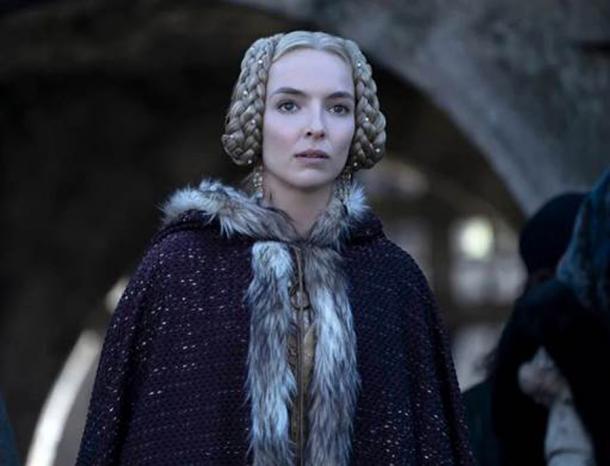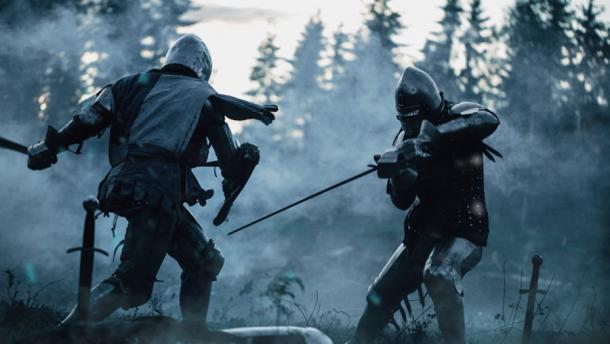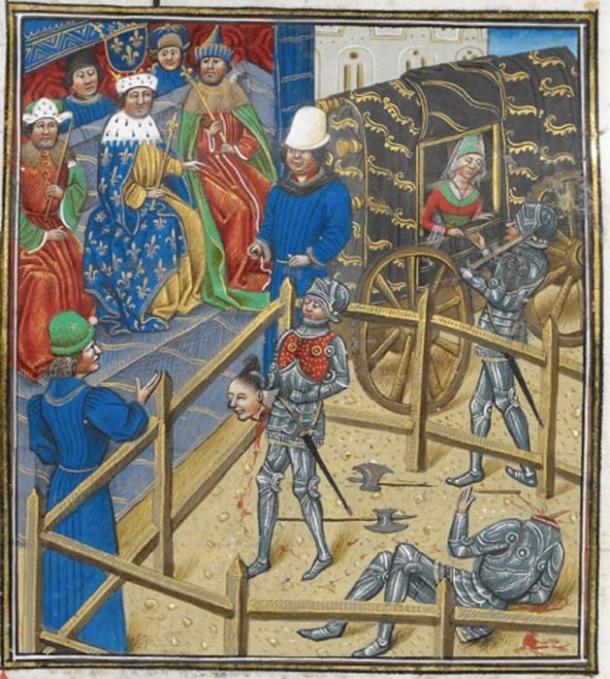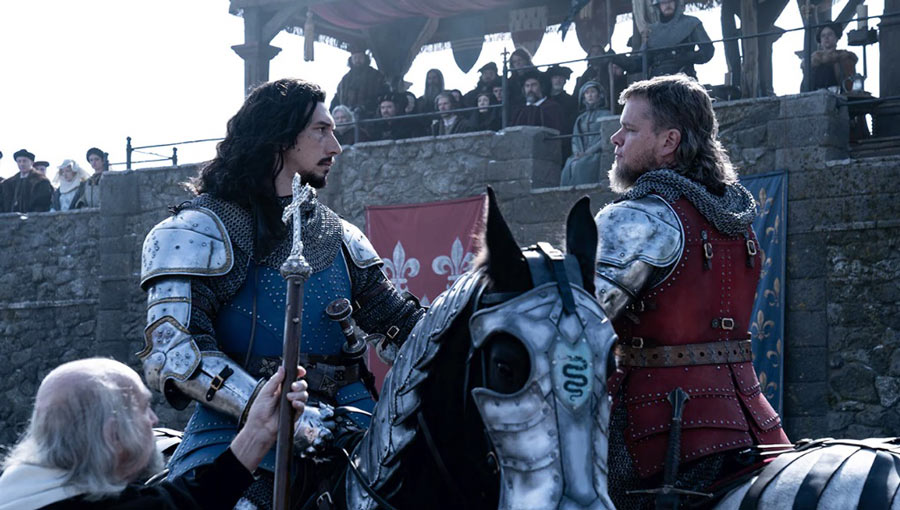Medieval chivalric duels were undoubtedly the most thrilling events of the time. The last vestige of the ancient gladiatorial fights, knightly duels were a true display of the skill with arms and chivalrous honor. But these duels were also a veritable aspect of the medieval judicial system , whereby two feuding knights could choose to settle the matter with their weapons. The man who won would be deemed chosen by God – and thus the matter was settled. One of the most famous such duels was the one between Sir Jean de Carrouges and the squire Jacques le Gris in 14th century France. The story of this so-called “Last Duel” became so popular, that it was retold for centuries afterwards. Recently it even became the subject of a blockbuster movie.
“The Last Duel” is More Than a Movie – It’s a True Story!
An exciting and high-quality blockbuster has just hit the cinema screens this autumn. The Last Duel is by all accounts a thrilling and promising historical movie , and an accurate representation of medieval trials by combat. Still, many of those that watched the movie didn’t know that it was based on actual historic events. This duel was a major event in 14th century French society, and the whole of the nation was buzzing with the controversial story. It was also the last judicial duel fought in France.
The main character within this historic story was one Jean de Carrouges IV, a prominent Norman knight. Jean was likely born around 1330 AD, the son of a minor noble and knight, Sir Jean de Carrouges III. A veteran soldier who was distinguished in the service of the regional Count of Perche, Jean’s father paved the way for his eldest son. The family owned a castle in their ancient seat of Carrouges, but also possessed other properties. Jean’s father was richly rewarded for his long life of military service, most notably by becoming the viscount of Belleme, setting the stage for his young son.
Matt Damon as Jean de Carrouges IV in The Last Duel. ( 20th Century Studios )
At the time, the French were engaged in a bitter conflict with the English. Of course, Jean de Carrouges was destined for the life of warfare – this was the common fate for many nobles and their sons in medieval France. In his youth, Jean served in the retinue of Count of Perche, and was active in several clashes and campaigns against the English in France. By the age of 21, he was given a part of the family estates. Now a noble in his own right, he continued his rise to prominence and success.
Bitter Rivalry Between Two Ex-Friends Ends in the “Last Duel”
In his youth, Jean de Carrouges became a good friend with Jacques le Gris, a squire and a neighbor to the Carrouges’ estate. The two men enjoyed a solid and friendly relationship. Le Gris was even the godfather to the firstborn child of Carrouges, from his first marriage to a lady called Jeanne de Tilly. Around this time, a new Count of Perche appeared on the scene – Peter II of Alençon the Noble. Both men – Carrouges and le Gris – swore their fealty to the new count, and quickly joined his close court circle, based at the city of Argentan. It was here that their relationship began to sour.
In no time, the young squire Jacques le Gris became a steadfast favorite of Count Peter. A notorious womanizer and entertainer, le Gris was loved at court and was inseparable from the powerful count. On several occasions, it happened that Jean the Carrouges was overlooked and unrewarded for his services, while Gris was showered with praise and rewards. Undoubtedly, jealousy played a part here, and the two men quickly went from friends to enemies.
It soon became public knowledge that they were bitter rivals at court. The French medieval court historian Jean Froissart, left a thorough account of the events, and writes of their relationship in great detail.
“Jacques le Gris and Jean de Carrouges, both of them of the household of Peter, Count d’Alençon, and esteemed by him; but more particularly Jacques le Gris, whom he loved above all others, and placed his whole confidence in him.”
Bad luck seemed to follow Jean de Carrouges in step. Not only was he overlooked at court, but his first wife and child tragically perished, dying together of natural causes. Life was uncertain at the time, due to hard and inhospitable living conditions, and nobles suffered too. Struck by this tragic loss, Jean set out on a five-month military campaign, distinguishing himself in bloody actions against the English. He returned home in 1380, his retinue halved, and soon set about regaining his good standing. He quickly found a new marriage proposal, marrying a young lady called Marguerite de Thibouville. This would be a turning point in the knight’s life.

Jodie Comer portrayed Marguerite de Thibouville in the film The Last Duel. (Patrick Redmond / 20th Century Studios )
Exploited and Savaged: The Rape of Marguerite
The marriage was seemingly one of interest. His new wife brought in a large dowry and a fresh chance for Jean to expand his possessions. However, this also placed him into conflict with the Count, especially due to his reputation as being temperamental man, quick to anger and very rash. His standing at the court was increasingly deteriorating. Squire Jacques le Gris, however, was loved at court and enjoyed a stellar relationship with the count. It’s probable that le Gris harbored great disdain for Carrouges, who – even though disliked – was much more powerful than he.
The fated event in the story of the “Last Duel” occurred in January of 1386. Jean de Carrouges departed on a journey to Paris, intent on finishing some business. He left his young wife, Marguerite, with their household servants at the chateau in Capomesnil. However, in a curious turn of events, the governess in charge of looking after Marguerite, also departed the chateau to deal with some tasks in the nearby town. Oddly enough, this left the young Lady Marguerite all alone in the chateau. On to the scene arrived Jacques le Gris, with malicious intent.
Apparently staying at his estates near to Capomesnil, Jacques le Gris travelled the short distance to the Carrouges chateau with a henchman. His henchman knocked on the door with some pretext to convince Marguerite to open the door, whence Jacques le Gris and his man barged violently into the house. Consumed by desire for the young wife of Jean de Carrouges, Le Gris flung her onto the floor and raped her. Once the deed was done, he threatened the young woman to keep silent or face terrible consequences.
Jean de Carrouges and His Search for Justice
Two days later, Jean de Carrouges returned to be reunited with his wife, and noticed something was amiss. Jean Froissart perfectly describes how Marguerite desperately recounted what happened in her husband’s absence:
“At last, when the household were in bed, she flung herself on her knees at his bedside, and bitterly bewailed the insult she had suffered. The night would not believe it could have happened; but at length, she urged it so strongly, he did believe her, and said, “Certainly, lady, if the matter has passed as you say, I forgive you, but the squire shall die; and I shall consult your and my relations on the subject: should you have told me a falsehood, never more shall you live with me.” The lady again and again assured him that what she had said was the pure truth.”
From that moment on, all hell broke loose for Jean de Carrouges. A temperamental man, fiercely clinging to his knightly honor, he felt utterly wronged by the dishonor perpetrated by his rival Jacques Le Gris. In search of justice, he initially went to the court of the Count d’Alençon, explaining the events and laying out his accusations. But he already knew what the outcome would be. A court favorite, Le Gris was quickly acquitted of all charges and proclaimed innocent. What is more, Marguerite was said to have “dreamt” the entire affair.
Unwilling to give up, Jean travelled to see the French king himself, all the way to Paris. But this time, he went with a plan. Since his case was weak (the only witness was his wife), Jean proposed to the King that the matter be settled through trial by combat. That way, the truly just man would have God’s favor on his side and justice would prevail. By that time, such trials were very rare in France and long out of fashion. What ensued was a lengthy trial, one that lasted an entire year. Both parties presented their cases to the King and soon enough, the Carrouges-Le Gris trial became a social sensation in Paris.

The Last Duel tells the story of a fight for justice between Jean de Carrouges and Jacques le Gris. ( Gorodenkoff / Adobe Stock)
Leaving Justice to Fate: The True Story of the Last Duel
Jacques le Gris was advised to request a church trial, which would be his sure way to victory in the case. But the rivalry between the two men was bitter – Le Gris was eager to accept Jean de Carrouges’ request to trial by combat. Not only would he face the man he hated, but would get the chance to receive substantial monetary recompense. In the end, the court gave in. As the case could not be adequately solved in court, the two men were permitted to fight a duel to the death . The event would become the talk of the entire city of Paris. Even the King was eager to watch the event, so much so that he postponed the duel by an entire month to ensure he would be able to attend.
On December 29th, 1386, the two men met at the battleground. Thousands of Parisians were there to bear witness, the Royal Court included. If he won, Jean de Carrouges would restore his wife’s honor and bring his rival to justice. However, if he lost the duel, his wife Marguerite would be burned alive, as this was the punishment for false accusation. The pressure on Jean was understandably enormous.
Both combatants were armed equally. They were both mounted and armored, and each had one lance, a battle-axe, a longsword, and a dagger at their disposal. Their duel began with jousting – both men scored direct hits and shattered their lances, which made them go for the battle-axes next. In the ensuing melee, Jacques le Gris managed to savagely behead the horse of his opponent, sending him to the ground. However, Jean de Carrouges also struck a blow – disemboweling his enemy’s horse. Now, both knights were on their feet, and the actual duel began. Using their longswords, they descended into a long and bitter duel. Throughout the combat, Jacques le Gris proved to be stronger and more agile than his enemy, maintaining the upper hand.
Eventually, Jean de Carrouges slipped. Le Gris took this chance and struck a fierce blow, piercing Jean’s thigh – much to the shock of the crowd. Still, Jean de Carrouges – a veteran of many battles – was not dismayed. Instead, he found a chance to grab hold of Le Gris’ helmet and pull him down to the ground. This was a turning point in the duel.
Due to the weight of his armor, Jacques le Gris could not get up. Carrouges then proceeded to batter him and tear off his helmet’s faceplate. Having overpowered Le Gris, he demanded that he admit his guilt. The latter still staunchly proclaimed his innocence, saying: “In the name of God and on the peril and damnation of my soul, I am innocent!” Jean de Carrouges proceeded to drive his dagger through his opponent’s exposed throat, killing him instantly. The “Last Duel” was won.

Miniature from medieval manuscript depicting the last duel between Le Gris and Carrouges. ( British Library )
Live by the Sword, Die by the Sword
Jean de Carrouges reclaimed his wife’s honor and gained favor at the Royal Court. He was showered with rewards and an increase in popularity in the years to come. Truth and justice had seemingly won the day. However, his luck would not hold. Just ten years following his famous duel, Jean de Carrouges would march off into the infamous Battle of Nikopolis, from which he would never return. It is presumed that he was killed alongside his commander, when their forces were trapped and destroyed by the Ottoman Turks . Nevertheless, his name and his fame continued to live on, all thanks to his heroic and chivalrous last duel. The Last Duel premiered at the Venice Film Festival in September 2021, and its theatrical release in the United States was on October 15th 2021.
Top image: Jaques Le Gris, played by Adam Driver on the left, and Jean de Carrouges, played by Matt Damon, in The Last Duel. Source: 20th Century Studios
By Aleksa Vučković
References
Classen, A. and Scarborough, C. 2012. Crime and Punishment in the Middle Ages and Early Modern Age: Mental-Historical Investigations of Basic Human Problems and Social Responses. Walter de Gruyter.
Muhlberger, S. Tales from Froissart. Nipissing University.
Taylor, C. 2013. Chivalry and the Ideals of Knighthood in France During the Hundred Years War. Cambridge University Press.
Various. 2010. Journal of Medieval Military History, Vol. 8. Boydell & Brewer.
